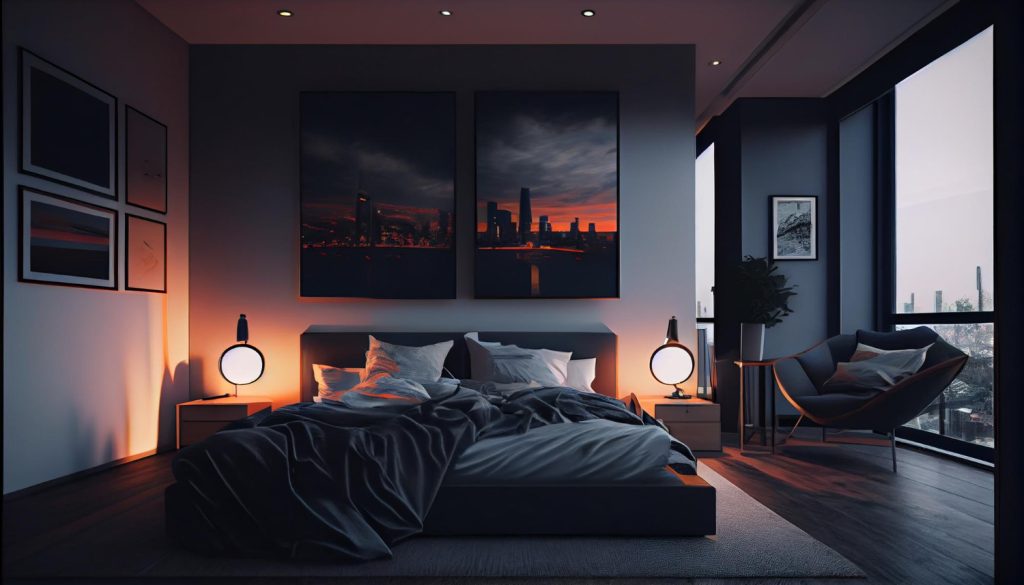Do you often find yourself tossing and turning at night, unable to achieve the restful sleep you crave? The quality of your sleep is profoundly influenced by the environment in which you rest. Here’s a detailed guide on how to transform your sleep space to enhance your sleep quality.
Best 14 Tips to Improve your Sleep Quality

1. Choose the Right Mattress
The foundation of a good night’s sleep starts with a comfortable mattress. Whether you prefer memory foam, innerspring, or hybrid, it depends upon your choice. Ensure your mattress supports your body well and suits your sleeping style. It’s recommended to replace your mattress every 7-10 years.
2. Invest in Quality Bedding
Soft, breathable sheets can significantly impact your sleep comfort. Go for natural materials like cotton or linen that regulate temperature and wick away moisture. Don’t forget a supportive pillow tailored to your sleeping position.
3. Control Room Temperature
A cooler environment is generally better for sleep. Aim to keep your bedroom temperature between 60-67°F (15-19°C). Use fans, air conditioning, or heaters to maintain the optimal temperature. Especially, in summers, cooler rooms make your sleep more comfortable and relaxing
4. Reduce Noise
Noise pollution disturbs the human mind and decreases productivity. Same applies for sleeping. Noise disrupts sleep, even if it doesn’t fully wake you. Consider using earplugs, white noise machines, or apps to drown out disruptive sounds. Heavy curtains or carpets can also help absorb sound.
5. Darken Your Room
Light interferes with your body’s production of melatonin, a hormone that regulates sleep. Use blackout curtains or shades to block external light. Dim the lights an hour before bedtime to signal to your body that it’s time to wind down.
6. Minimize Electronics
The blue light emitted by phones, tablets, and computers can interfere with melatonin production. Try to avoid screens at least one hour before bed. If you must use electronics, consider blue light filters or apps that adjust the light based on the time of day.
7. Declutter Your Space
A tidy room promotes relaxation and reduces stress. Keep your bedroom clutter-free by organizing and storing items out of sight. A clean environment can create a sense of calm and order.
8. Introduce Calming Scents
Aroma therapy can help promote relaxation and improve sleep quality. Essential oils like lavender, chamomile, and sandalwood are known for their calming properties. Use a diffuser, spray, or even a scented candle to infuse these scents into your room.
9. Establish a Sleep Routine
Consistency is key to regulating your body’s internal clock. Try to go to bed and wake up at the same time every day, even on weekends. A pre-sleep routine can also help signal to your body that it’s time to wind down.
10. Incorporate Relaxing Activities
Engage in activities that help you relax before bed. Reading, listening to calming music, or practicing meditation can help transition your mind and body into sleep mode. Avoid stimulating activities like intense exercise or heavy meals close to bedtime.
11. Consider Your Sleeping Position
Your sleeping position can impact your comfort and sleep quality. Side sleepers may benefit from a firmer pillow, while back sleepers might need thinner support. Experiment with different pillows and positions to find what works best for you.
12. Limit Caffeine and Alcohol
Both caffeine and alcohol can interfere with your sleep cycle. Avoid consuming these substances at least 4-6 hours before bedtime. Opt for herbal teas or warm milk instead.
13. Stay Hydrated, but Not Too Much
Dehydration can disrupt sleep, but so can frequent trips to the bathroom. Drink water throughout the day to stay hydrated, and limit your intake an hour before bed to minimize interruptions.
14. Seek Professional Help if Needed
If you’ve tried everything and still struggle with sleep, it might be time to consult a healthcare professional. Sleep disorders like insomnia or sleep apnea require specialized treatment that can significantly improve your sleep quality.
Also Read
Final Words
Sleep is a very important need of human life. Sleep cannot be ignored otherwise bad sleep will lead to many serious health consequences in future. A man can remain healthy after being deprived of food and water for a certain period of time but cannot live healthy if sleep cycle is disturbed. Hence,in this blog we tried to emphasize the importance of the necessity of good sleep. Not over emphasising, but telling the factual points regarding sleeping.
By implementing these 14 tips mentioned in this blog, you can create a sleep-friendly environment that enhances your rest and rejuvenation. Sweet dreams!
Share your progress with us!
Stay tuned with Rabt Marketing.

